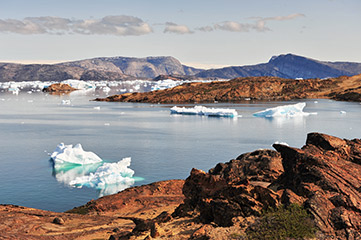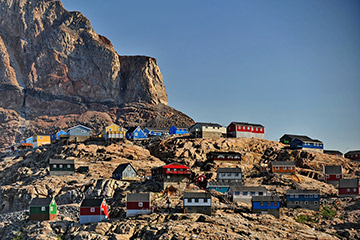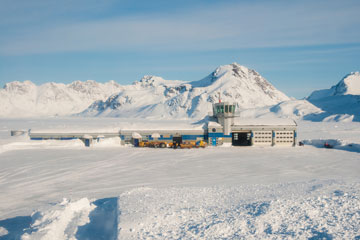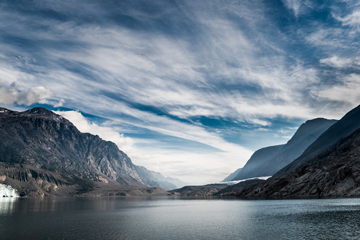The Large-Scale Projects Act
On 7 December 2012, the Greenlandic Parliament, Inatsisartut, passed a new bill on Large-Scale Projects. The bill has been heavily debated in both Greenland and Denmark as it allows foreign companies to contract foreign workers on collective agreements negotiated with trade unions outside Greenland.
The aim of the bill is to promote foreign investments in Greenland and to prevent and limit negative consequences to the Greenlandic society. The Act came into force on 1 January 2013.
Introduction
On 7 December 2012, the Greenlandic Parliament, Inatsisartut, passed a new bill on Large-Scale Projects. The bill has been heavily debated in both Greenland and Denmark as it allows foreign companies to contract foreign workers on collective agreements negotiated with trade unions outside Greenland.
The aim of the bill is to promote foreign investments in Greenland and to prevent and limit negative consequences to the Greenlandic society. The Act came into force on 1 January 2013.
Scope of the Act
The Large-Scale Projects Act only applies to the establishment of large-scale businesses for the exploitation of minerals or hydraulic power.
A project qualifies as "large-scale" if it involves a capital expenditure of more than DKK five billion (approximately EUR 670 million). Further, either the project's need for labour in connection with the construction phase must exceed the suitable, available and accessible workforce in Greenland or the technical and financial demands to the companies performing the construction work must exceed the capacity of the Greenlandic companies. In order to be classified as a large-scale project, both the financial and qualitative conditions must be fulfilled. Thus, the Act exclusively applies to the establishment of large-scale businesses that are so comprehensive that they exceed the Greenlandic companies' capacity and workforce.
A company considering initiating a large-scale project under the Act needs to obtain permission from the government in Greenland, Naalaakkersuisut. Before such permission is granted, the relevant Greenlandic authorities will have to make an evaluation of the environmental and social sustainability of the project. Once permission is granted, the company must register with the Greenlandic Registry for Companies and establish a local company ("the Project Company").
The Large-Scale Projects Act only applies during the construction phase of a large-scale project. As soon as the construction phase is over and the project moves on to the production phase, regular Greenlandic legislation will apply.
Employment of Foreign Workers
One of the major issues in the Large-Scale Projects Act is the possibility for the Project Company to use foreign labour in the construction phase. Pursuant to Section 10 of the Act, foreign workers must be employed on salary and working terms which are "acceptable" and "objectively and reasonably justified". Terms and conditions set out in a collective bargaining agreement entered into between the Project Company and a (foreign) trade union are, in general, considered acceptable and objectively fair.
As mentioned above, the Large-Scale Projects Act allows the Project Company to enter into collective bargaining agreements with foreign trade unions covering the employees of the relevant nationality - i.e. a collective bargaining agreement entered into with a Chinese union will cover the Chinese employees, whereas a collective bargaining agreement with a Latvian union will cover the Latvian employees.
The Act also opens for the possibility for the Project Company to conclude collective bargaining agreements with multiple unions from the same jurisdiction.
The collective agreements are, however, restricted from fixing wages lower than the minimum wage set forth in collective bargaining agreements concluded between the Greenlandic employee organisation SIK and the employers' organisation GA; currently DKK 80.41.
However, the Act allows the Project Company to include expenses related to the employees, for instance clothing, room and board, insurance and travel, when calculating the wage. Therefore, it has been an important issue in the debate to set a limit to the amount of expenses the Project Company is allowed to include when calculating the wage. Consequently, the Act contains an authorisation for the government to fix a maximum value of such employee-related expenses.
It is particularly important to note that the employment terms and working conditions must also be in compliance with Greenland's international obligations and existing legislation in Greenland, including the immigration law. This means that foreign workers employed under these special terms of employment are not allowed to be assigned to other work that is not covered by the Large-Scale Projects Act.
The Project Company must ensure that the foreign employees leave Greenland when they are no longer working on the large-scale project.
The Danish government administers the immigration law in Greenland. As it is not possible to grant a residence and work permit to foreign workers employed to carry out large-scale projects within the framework of the current immigration law, the Danish Parliament must pass a special act regulating such foreign workers in order for the Large-Scale Projects Act to achieve the desired effect in Greenland. This is expected to take place later in 2013.
Other Working Conditions
The Greenlandic health and safety legislation will be fully applicable during the construction phase. The Project Company will thus have a duty to contribute to ensuring that every employee can work under safe and healthy conditions. This applies regardless of whether the Project Company engages foreign or Greenlandic employees.
The Large-Scale Projects Act also specifies that certain insurances are mandatory, including industrial injury insurance and insurance to guarantee payment of the costs to cover evacuation, transport and medical treatment of injured employees.
Foreign employees working on a large-scale project covered by the Act are, however, not subject to the Greenlandic Holiday Act if they are covered by foreign collective agreements.
Conclusion
The Large-Scale Projects Act has been heavily criticised, especially the terms and conditions of employees working on large-scale projects. The Greenlandic employee organisation SIK fears that the Large-Scale Projects Act will result in social dumping, while the employers' organisation GA fears that the Large-Scale Projects Act will lead to a complete distortion of competition.
The Act is likely to have a huge influence on the Greenlandic community. For example, London Mining is planning to establish a large iron mine near the capital, Nuuk. Chinese investors are planning to invest DKK 14 million in the project.
The Greenlandic government has already - less than one year after the Act has been adopted - announced that it is considering revising the Large-Scale Projects Act. A revision proposal has not been put forward yet, but it is expected that a revision will strengthen the involvement of the Greenlandic labour organisations in relation to the employment terms and conditions of foreign employees.






